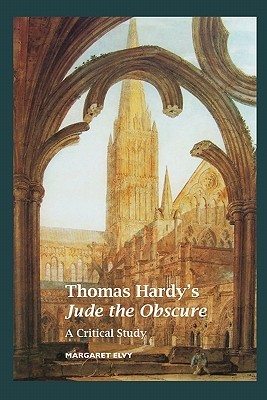
- We will send in 10–14 business days.
- Author: Margaret Elvy
- Publisher: Crescent Moon Publishing
- ISBN-10: 1861712863
- ISBN-13: 9781861712868
- Format: 15.6 x 23.4 x 1 cm, minkšti viršeliai
- Language: English
- SAVE -10% with code: EXTRA
Reviews
Description
THOMAS HARDY'S JUDE THE OBSCURE
A study of the novel Jude the Obscure using contemporary feminist and literary theory.
Illustrated, with notes and a bibiography.
Jude the Obscure (1895), Thomas Hardy's last novel, is a sister (or brother) book to Tess of the d'Urbervilles (1891), before he turned to poetry and other forms of writing. The author attacks similar targets: the family, politics, religion, marriage, education and sexuality. Hardy was on fire when he wrote Jude the Obscure - it is a very angry work.
Jude the Obscure, though, contains far more polemic and philosophizing than Tess or any of the earlier novels. The preaching and polemic threatens to undo the narrative, which is nevertheless 'realist', like other Thomas Hardy fictions.
In Jude the Obscure, Hardy was stretching the novel to the limit, testing the boundaries of what is 'acceptable'. In Jude the Obscure, the things that say 'you shan't' are, variously, God, religion, education, circumstance, chance, nature, and marriage. All of the institutions and 'causes' reside inside the individual, which is what makes the problems they create so difficult to deal with for Sue and Jude. Patriarchy, culture and society are not in some 'out there' space, but in people. Hardy's thoughts on Jude the Obscure, as expressed in the Life and letters, include his desire for a novel about characters 'into whose souls the iron has entered'; a desire to make the story 'grimy' in order to heighten the contrast between the ideal life and the 'squalid real life'; the novel 'makes for morality', Hardy said; and ended up 'a mass of imperfections', a remark many artists have made of their work.
EXTRA 10 % discount with code: EXTRA
The promotion ends in 22d.16:42:00
The discount code is valid when purchasing from 10 €. Discounts do not stack.
- Author: Margaret Elvy
- Publisher: Crescent Moon Publishing
- ISBN-10: 1861712863
- ISBN-13: 9781861712868
- Format: 15.6 x 23.4 x 1 cm, minkšti viršeliai
- Language: English English
THOMAS HARDY'S JUDE THE OBSCURE
A study of the novel Jude the Obscure using contemporary feminist and literary theory.
Illustrated, with notes and a bibiography.
Jude the Obscure (1895), Thomas Hardy's last novel, is a sister (or brother) book to Tess of the d'Urbervilles (1891), before he turned to poetry and other forms of writing. The author attacks similar targets: the family, politics, religion, marriage, education and sexuality. Hardy was on fire when he wrote Jude the Obscure - it is a very angry work.
Jude the Obscure, though, contains far more polemic and philosophizing than Tess or any of the earlier novels. The preaching and polemic threatens to undo the narrative, which is nevertheless 'realist', like other Thomas Hardy fictions.
In Jude the Obscure, Hardy was stretching the novel to the limit, testing the boundaries of what is 'acceptable'. In Jude the Obscure, the things that say 'you shan't' are, variously, God, religion, education, circumstance, chance, nature, and marriage. All of the institutions and 'causes' reside inside the individual, which is what makes the problems they create so difficult to deal with for Sue and Jude. Patriarchy, culture and society are not in some 'out there' space, but in people. Hardy's thoughts on Jude the Obscure, as expressed in the Life and letters, include his desire for a novel about characters 'into whose souls the iron has entered'; a desire to make the story 'grimy' in order to heighten the contrast between the ideal life and the 'squalid real life'; the novel 'makes for morality', Hardy said; and ended up 'a mass of imperfections', a remark many artists have made of their work.


Reviews